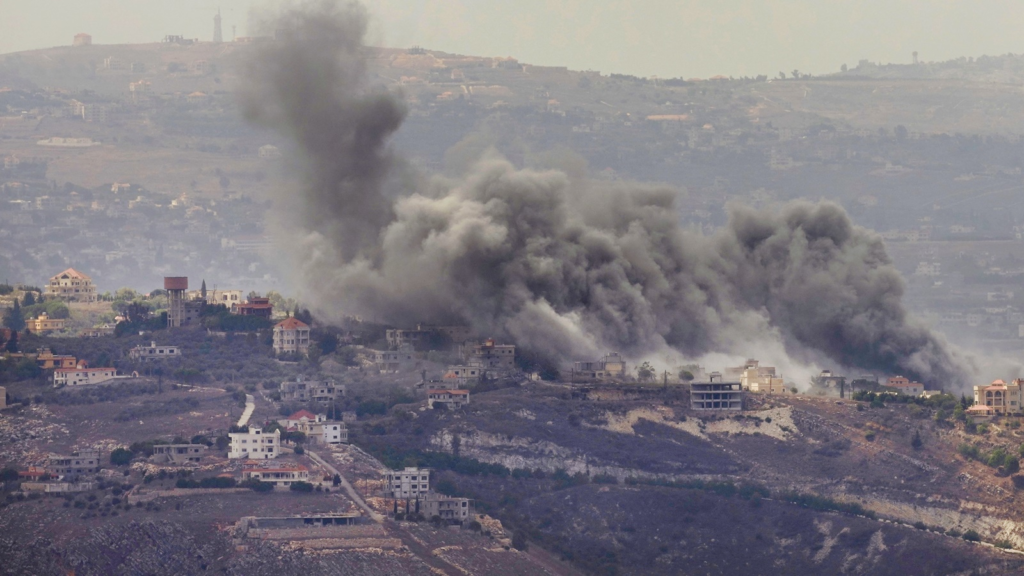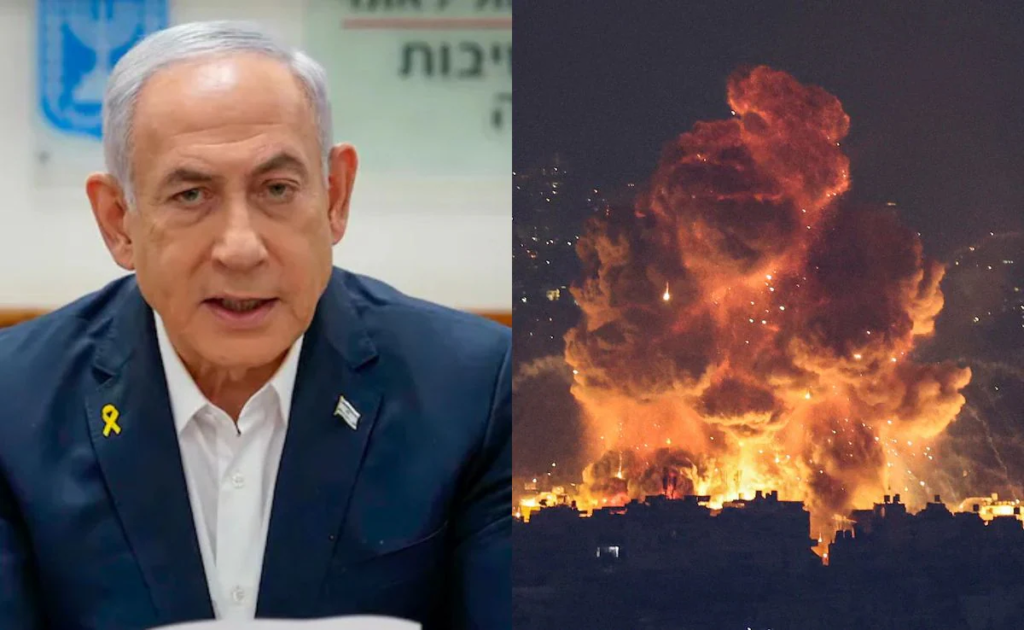On Tuesday, the Lebanese militant group Hezbollah launched a significant retaliatory attack on Israel, targeting two military bases near Tel Aviv and a naval base near Haifa. These strikes came in response to overnight Israeli airstrikes on southern Lebanon and the southern suburbs of Beirut.
Hezbollah’s retaliatory salvo was aimed at Israel’s Unit 8200, a crucial part of the country’s military intelligence apparatus, as well as the Nirit area in Tel Aviv and a naval base outside Haifa. The attacks have escalated tensions in a region already fraught with conflict, adding to the ongoing Gaza war and the conflict between Hezbollah and Israel.
U.S. Secretary of State Antony Blinken’s arrival in Israel to push for a cease-fire further underscored the gravity of the situation, as diplomatic efforts continue to fail in resolving the prolonged violence.
Escalating Conflict Between Hezbollah and Israel
The recent attacks by Hezbollah mark a significant escalation in the long-standing conflict between the group and Israel. Since the start of the Gaza war in October 2023, sparked by an incursion by Palestinian resistance group Hamas, tensions between Hezbollah and Israel have only grown.
The conflict had already seen a series of exchanges of fire across Lebanon’s southern border with Israel, but the intensity and scope of the recent Hezbollah strikes demonstrate the deepening nature of the hostilities.
Hezbollah targeted critical Israeli military installations, including the Glilot base used by Unit 8200, which is known for its signals intelligence operations and cyber warfare capabilities. These attacks reflect Hezbollah’s strategy of striking at the heart of Israel’s intelligence and defense systems, signaling its determination to confront Israeli military actions.
Read : Israel Gives Demand List to White House for Ending War in Lebanon
The naval base near Haifa, a key point for Israeli naval operations, was also hit, highlighting the geographical breadth of Hezbollah’s retaliation.
While Hezbollah’s strikes are notable for their precision and choice of targets, Israeli authorities have downplayed the damage, stating that many projectiles fell in open areas without causing significant casualties or destruction.
Read : Israel Has Made Largest West Bank Seizure in 3 Decades: Peace Now
Air sirens in Tel Aviv and surrounding areas were activated, warning residents of incoming attacks, but no major harm was reported. Despite this, the symbolic impact of the strikes cannot be ignored, as Hezbollah has sent a clear message about its ability to target key Israeli military assets.
U.S. Diplomatic Efforts Amid Rising Tensions
The timing of Hezbollah’s attacks coincided with the arrival of U.S. Secretary of State Antony Blinken in Israel. Blinken’s visit, his 11th to the region since the outbreak of the Gaza war, comes as the Biden administration seeks to de-escalate the situation and push for a cease-fire.
Blinken’s Middle East trip also includes stops in Jordan and Qatar, where he will hold discussions on how to bring an end to the Gaza war and defuse the broader regional conflict involving Hezbollah and Iran-backed groups.
Diplomatic efforts, however, have struggled to gain traction. Israel’s military campaign against Hamas in Gaza and its confrontations with Hezbollah in Lebanon have continued unabated. The situation has only worsened, with neither side willing to make meaningful concessions.
Israel’s leadership, under Prime Minister Benjamin Netanyahu, remains resolute in its stance that the fighting will continue until its objectives are achieved, particularly following the killing of Hamas leader Yahya Sinwar in a targeted strike last week.

The United States, while trying to mediate and foster negotiations, faces the challenge of balancing its support for Israel with the broader goal of regional stability. Blinken’s meetings in Israel are expected to cover not only the ongoing military campaigns but also the larger issue of Iran’s role in the conflict.
Iran, which backs both Hezbollah and Hamas, has been a key player in the regional dynamics, and its involvement further complicates efforts to reach a cease-fire.
Blinken’s visit is also significant given the recent ballistic missile attacks by Iran on Israel, which occurred on October 1, 2023. Israel has vowed to retaliate, and the prospect of a wider conflict involving Iran looms large over the region. The U.S. is keen to avoid further destabilization, particularly as any Israeli retaliation against Iran could have far-reaching consequences, including disruptions to global oil markets and the risk of a full-scale war between Israel and Iran.
Iran’s Role and the Risk of a Wider Conflict
Iran’s involvement in the ongoing conflicts in Gaza and Lebanon cannot be understated. As the primary backer of both Hamas and Hezbollah, Iran has provided these groups with financial support, weapons, and strategic guidance.
The October 1 ballistic missile attack on Israel, which was attributed to Iran, marked a dangerous escalation in the conflict, pushing the region closer to a broader war. Israel’s leadership has made it clear that it will retaliate against Iran for these attacks, raising concerns about the potential for further violence and instability.
Iran, for its part, has taken steps to defend itself diplomatically. Iran’s Foreign Ministry recently lodged a complaint with the U.N. nuclear watchdog, accusing Israel of threatening to attack its nuclear facilities.
Iranian officials, including Foreign Minister Abbas Araqchi, have warned that any attack on Iran’s nuclear infrastructure would be considered an international crime. Araqchi emphasized that Iran does not seek war in the Middle East but is prepared to defend itself if necessary.
The risk of Israeli strikes on Iran’s nuclear facilities is a particularly concerning development, as such actions could provoke a severe regional conflict. Iran’s nuclear program has long been a point of contention between Tehran and the international community, with Israel repeatedly expressing its determination to prevent Iran from acquiring nuclear weapons.
Any Israeli attack on Iranian nuclear sites could spark a broader conflict, drawing in other regional powers and leading to widespread devastation.

In this context, Blinken’s visit to Israel takes on added significance. The U.S. is keen to avoid a confrontation between Israel and Iran, which would have devastating consequences for the entire region. As Blinken meets with Israeli officials and leaders from neighboring countries, the focus will be on finding a path to de-escalation and preventing the conflict from spiraling out of control.
However, achieving a breakthrough in the current situation will be difficult. The conflict between Israel and Hamas, now in its second year, has shown no signs of abating. Hezbollah’s involvement, combined with Iran’s support for both Hamas and Hezbollah, adds further complexity to an already volatile situation. While Blinken’s visit may provide an opportunity for dialogue, it is unlikely to result in an immediate resolution.
The Broader Implications for the Middle East
The escalating conflict between Hezbollah and Israel, along with the ongoing war in Gaza, has far-reaching implications for the Middle East. The region has long been a flashpoint for violence, and the involvement of multiple actors—Israel, Hezbollah, Hamas, Iran, and the U.S.—makes it difficult to predict how the situation will evolve.
The potential for a full-scale war involving Israel and Iran is particularly concerning, as such a conflict would likely draw in other regional powers and have a devastating impact on the region’s stability.
The Gaza war has already resulted in significant loss of life, with over 42,500 Palestinians killed in Israeli airstrikes and another 10,000 missing under the rubble, according to Gaza health authorities. Israel’s military campaign has been marked by its determination to eliminate Hamas leadership and infrastructure, but the human toll has been immense.
Meanwhile, Hezbollah’s involvement in the conflict, coupled with the possibility of Israeli strikes on Iran, raises the specter of further violence and instability in Lebanon, Syria, and beyond.

Diplomatic efforts to resolve the conflict have so far been unsuccessful, and the outlook remains bleak. The Biden administration has been pushing for a cease-fire, but neither Israel nor Hamas seems willing to make the necessary concessions. The involvement of Hezbollah and Iran only complicates matters further, making it difficult to envision a peaceful resolution in the near future.
In the meantime, the people of Gaza, Lebanon, and Israel continue to suffer the consequences of the ongoing violence. As the conflict drags on, the international community must continue to press for negotiations and a lasting cease-fire, even as the prospects for peace remain elusive.

